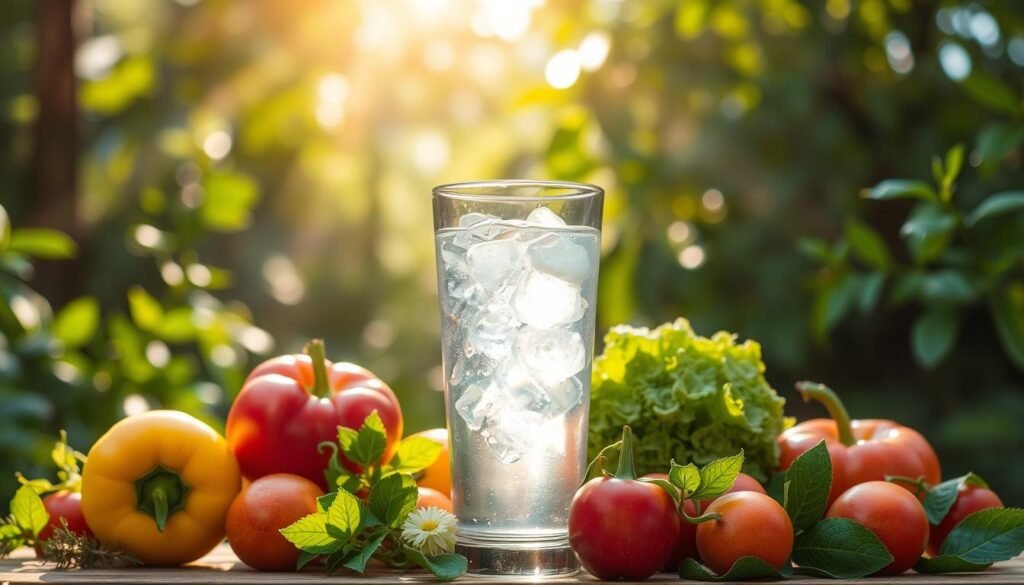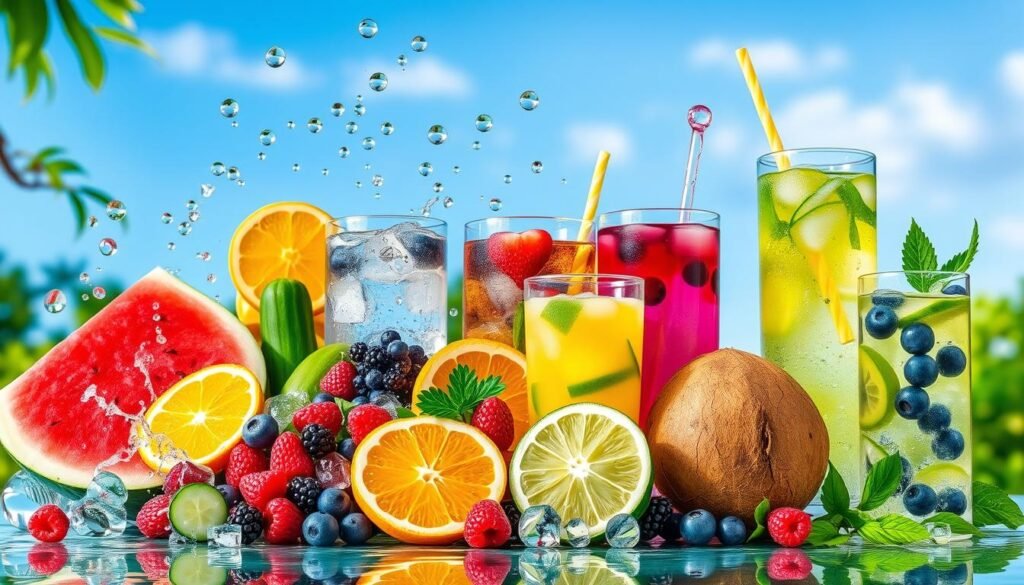
As I go about my daily life, I realize that staying hydrated is crucial. It’s vital for my physical health, cognitive function, and overall well-being. Drinking enough water helps my body function well, and I’ve learned to make hydration a priority.
Staying hydrated helps me perform at my best, whether I’m working out or just going about my daily routine. It’s also essential for my cognitive function.
By staying hydrated, I can maintain my physical health and support my cognitive function. I’ve come to understand that staying hydrated is not just about drinking water. It’s also about making healthy choices that support my overall well-being.
Staying hydrated is essential for my physical health. It also plays a critical role in my cognitive function. It helps me stay focused and alert throughout the day.
Key Takeaways
- Staying hydrated is essential for maintaining physical health and cognitive function
- Drinking enough water is vital for supporting overall well-being
- Staying hydrated helps support physical performance and cognitive function
- Hydration is critical for maintaining focus and alertness throughout the day
- Making healthy choices, including staying hydrated, is essential for overall health and well-being
Understanding the Fundamentals of Hydration
Exploring hydration, I see how key it is to grasp its basics. Hydration lets our bodies get the water they need to work right. Water is essential for keeping our body temperature stable, moving nutrients and oxygen, and getting rid of waste.
Keeping a balance between how much water we drink and lose is vital. This balance helps our bodies run smoothly. Here are some important hydration points to remember:
- Water intake: Drinking enough water all day to replace lost fluids.
- Water output: Losing water through urination, sweating, and other body functions.
- Balance: Finding a balance between drinking and losing water to stay hydrated.
Knowing these basics helps us see why hydration is so important. It shows us how to stay healthy by drinking enough water.
The Science Behind Water’s Role in Your Body
Exploring the science of water in our bodies is truly fascinating. Water is key to keeping us healthy. It helps control our body temperature, moves nutrients and oxygen to our cells, and gets rid of waste. Knowing how water works helps us see why drinking it is so important.
Some key benefits of drinking water include:
- Boosting energy levels and mental performance
- Supporting kidney function and reducing the risk of kidney stones
- Aiding in weight loss and management
By drinking enough water and making it a habit, we can feel better and stay healthy.
How much water we need can change based on our age, sex, weight, and how active we are. But most experts say we should drink at least eight cups (64 ounces) a day. Staying hydrated and following these guidelines helps us stay physically and mentally fit.
In conclusion, the science of water in our bodies is both complex and intriguing. By understanding the importance of staying hydrated and following the right water intake, we can enjoy many benefits. This helps us keep our health in top shape.
| Benefits of Drinking Water | Importance |
|---|---|
| Boosting energy levels | High |
| Supporting kidney function | High |
| Aiding in weight loss | Moderate |
Staying Hydrated is Essential for Maintaining Physical Health, Cognitive Function
Hydration is more than just drinking water. It’s about hydrating for health. It affects our physical performance, brain function, and overall health. Knowing how hydration works in our bodies helps us stay hydrated and enjoy its benefits.
Hydration is key for physical performance. Even a little dehydration can make us tired, dizzy, and less productive. But, staying hydrated boosts our energy, endurance, and muscle function. For our brains, hydration helps us stay focused, concentrate, and remember things better. Dehydration can make us feel foggy, moody, and give us headaches.
Impact on Physical Performance
- Improves energy levels and endurance
- Supports muscle function and reduces cramping
- Enhances athletic performance and reduces injury risk
Effects on Brain Function
- Supports focus, concentration, and memory
- Reduces risk of headaches and mood swings
- Improves cognitive function and productivity
By focusing on hydration importance, we can enjoy many benefits. Drinking water, eating hydrating foods, or using staying hydrated tips helps us control our hydration. This keeps our bodies and minds working at their best.
| Hydration Benefits | Physical Performance | Brain Function |
|---|---|---|
| Improved energy levels | Boosted endurance | Enhanced focus |
| Reduced fatigue | Supports muscle function | Improved cognitive function |
Signs You’re Not Drinking Enough Water
Reflecting on my hydration habits, I see how easy it is to forget to drink water. Our bodies are about 60% water, crucial for health and well-being. Yet, we often don’t notice we’re not drinking enough until we feel bad.
Common signs include feeling tired, getting headaches, and having dry skin. You might also get constipated or feel bloated if you don’t drink enough water intake. It’s key to listen to your body and drink more.
Here are some tips to boost your water intake and hydration habits:
- Drink a glass of water as soon as you wake up
- Keep a water bottle with you all day
- Try adding fruits or herbs to your water for a better taste
- Drink water before and after working out
By being aware of our hydration habits and making small changes, we can get healthier. Drinking water is simple yet powerful for our bodies. Let’s focus on staying hydrated and healthy.
How Much Water Do You Really Need?
To find the right amount of water, consider your age, sex, weight, and how active you are. Drinking enough water is key for your body and mind. Water is essential for many body functions.
Most people should drink at least eight glasses of water a day. But, this can change based on your life. For example, athletes or those who work out a lot might need more water.
Daily Water Intake Guidelines
- Drink at least eight glasses of water per day
- Adjust your water intake based on your activity level
- Consider your age, sex, and weight when determining your optimal hydration levels
If you’re pregnant or breastfeeding, you might need more water. Always drink when you feel thirsty. This is your body’s way of telling you it needs water. By focusing on hydration, you help your body stay healthy and balanced.
Beyond Water: Other Sources of Hydration
Exploring hydration shows it’s not just about drinking water. Fruits and vegetables also play a big role. They help keep us hydrated. This understanding highlights the value of drinking water and other hydrating drinks.
Some top hydrating sources include:
- Fruits like watermelon, cantaloupe, and strawberries, which are rich in water content
- Vegetables like cucumbers, celery, and tomatoes, which are also high in water content
- Other beverages like milk, juice, and tea, which can contribute to our daily hydration needs
Knowing about dehydration effects is key. They can be mild or severe. Adding these hydrating foods and drinks to our diet helps avoid dehydration. This boosts our physical and mental performance. Staying hydrated is crucial for our health and well-being.

By choosing wisely in our diet and hydration, we can avoid dehydration. This lets us enjoy many hydration benefits. So, let’s explore more hydrating options to stay healthy and thrive.
Smart Strategies to Increase Your Daily Water Intake
Staying hydrated is key for good health and feeling your best. Drinking enough water has many benefits. To drink more water, you need a plan and to stick to it.
One good way is to make a hydration schedule. This means drinking water at the same time every day. Or, use your phone to remind you to drink water. There are apps and devices that help track how much water you drink.
Creating a Hydration Schedule
- Drink a glass of water as soon as you wake up
- Keep a water bottle with you throughout the day
- Set reminders to drink water at specific times
Making Hydration a Natural Habit
Turning hydration into a habit takes time and effort. But it’s worth it for your health. By making drinking water a part of your daily routine, you can feel better and stay healthy. Remember, staying hydrated is crucial for your body’s health, and with the right strategies, you can make it a priority.
| Benefits of Hydration | Importance |
|---|---|
| Improves physical performance | High |
| Supports brain function | High |
| Helps with weight management | Moderate |
Common Myths About Hydration Debunked
Exploring hydration, I’ve found many myths that are confusing. One myth is that drinking too much water can cause water poisoning. But this is rare and happens when someone drinks a lot of water quickly. Hydration for brain function is key, and drinking enough water can boost brain power and work efficiency.
Another myth is that only water counts for daily hydration. But, reasons to stay hydrated include drinking other fluids like milk, juice, and tea. Also, eating foods high in water, like watermelon and cucumbers, helps too. Here are some tips to stay hydrated:
- Drink at least eight glasses of water a day
- Eat hydrating foods
- Limit sugary drinks and caffeine
Staying hydrated is vital for our health and hydration for brain function. By knowing the truth about hydration and debunking myths, we can make better choices about our water intake.
| Myth | Reality |
|---|---|
| Drinking too much water can lead to water poisoning | Rare and usually occurs when someone drinks an excessive amount of water in a short period |
| Only water contributes to daily hydration needs | Other fluids and hydrating foods also contribute to daily hydration needs |
Special Considerations for Different Activities
Exploring hydration, I see that different activities need special hydration plans. Whether you’re an athlete or someone with a desk job, knowing how to stay hydrated is key for top physical performance.
For exercise and sports, drinking lots of water is crucial. It helps avoid dehydration and keeps your body working well. Here are some tips:
- Drink at least 16-20 ounces of water 1-2 hours before exercise
- Take regular water breaks during exercise to stay hydrated
- Avoid sugary drinks that can worsen dehydration
Work, office settings, travel, and outdoor activities also need hydration focus. Being mindful of your water intake helps keep you healthy and performing well.

By focusing on hydration, you can reach your full potential. This is true whether you’re into exercise and sports or just living your daily life.
When to Increase Your Water Intake
When I think about my day, I see times when I need more water. For example, in hot weather or during travel and outdoor activities, I sweat a lot. It’s key to drink more to keep my body hydrated.
In work and office settings, it’s easy to forget to drink water. But staying hydrated helps me stay focused and productive. I always have a water bottle at my desk and drink from it often.
Also, when I’m not feeling well, I drink more water to help my body heal. Drinking water helps replace lost fluids and boosts my immune system.
- Drink water regularly throughout the day
- Monitor my urine output to ensure it’s pale yellow or clear
- Avoid sugary drinks that can dehydrate me further
By paying attention to my water intake, I can keep my body hydrated. This supports my health and well-being.
The Link Between Hydration and Long-term Health
Exploring hydration’s role, I see its benefits go beyond immediate health. It’s key for long-term health, affecting disease prevention, mental health, and aging.
Drinking enough water can prevent many diseases, like kidney stones and some cancers. It also helps with mental health, as dehydration can lead to anxiety and depression. Plus, it keeps our skin looking young and healthy.
To stay hydrated for better health, consider these tips:
- Drink at least eight glasses of water a day
- Eat hydrating foods like watermelon and cucumbers
- Stay away from sugary drinks and caffeine, as they can dry you out
By focusing on hydration, we can enjoy many health benefits. These include preventing diseases, improving mental health, and slowing aging.
| Hydration Benefits | Description |
|---|---|
| Disease Prevention | Reduces the risk of kidney stones, urinary tract infections, and some types of cancer |
| Mental Health Connections | Helps to reduce symptoms of anxiety and depression |
| Anti-aging Properties | Helps to keep skin looking healthy and youthful |
Conclusion: Making Hydration a Lifelong Priority
Staying hydrated is crucial for our health. It boosts our physical and mental well-being. We need to know how water works in our bodies and drink more water every day.
Drinking enough water helps us perform better and think clearer. It also keeps us healthy in the long run. By learning the truth and adapting to our activities, we can make drinking water a habit.
Choosing to drink more water is a smart choice for our health. It helps us live better and happier lives. So, let’s celebrate water’s benefits and make drinking it a lifelong habit.